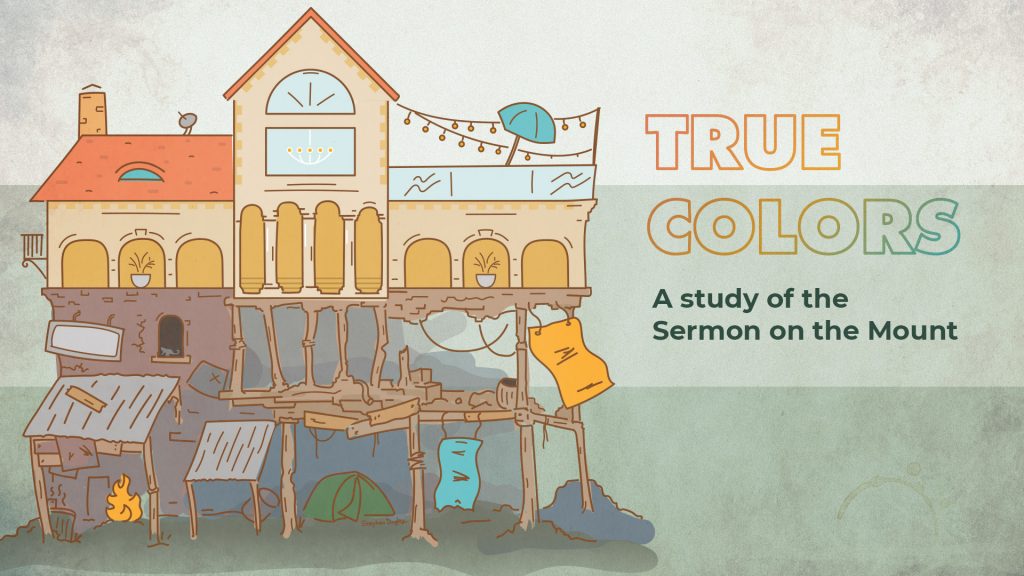Passage: Matthew 5:17-20
Guide for Group Discussion or Personal Reflection
Sermon Summary
In Matthew 5:17-20, Jesus describes the righteousness he has come to reveal to the world, and the righteousness he therefore requires of his followers.
Jesus begins by responding to a mistaken impression about his views on righteousness. Because Jesus announced the coming of a new kingdom, welcomed sinners into it, associated with all the “wrong” kind of people, and often broke with the religious leaders’ interpretations of the law, the Pharisees had the impression that he was devaluing the need for righteousness—even of trying to “abolish the law” itself (5:17). Some people today share this mistaken view of Jesus—that he is somehow setting himself in opposition to the God of the OT, and his law, preaching grace while “relaxing” the moral requirements of Scripture.
Jesus’ response to this was swift and strong: he “had not come to abolish the Law or the Prophets…but to fulfill them” (5:18). Jesus himself was the very fulfillment of the whole the Old Testament, which means that “not an iota, not a dot” of the Scriptures would pass away—including its moral demands—but would stand, eternally authoritative and helpful, pointing us to their fulfillment in Jesus. Because Jesus also intensifies everything he fulfills in the OT, this means that he intensifies the demand for righteousness found in the Old Testament. Jesus’ own life and ministry are a picture of his pressing into the very heart of the Law’s requirements, fulfilling it to a deeper level than we could have ever imagined.
Therefore, as followers of Jesus today, we should not “relax” even the least of the commandments found in the Scriptures (5:19), and we should pay heed to where we’re tempted to do so. We might obey a command of Scripture in a different way than how it was originally written, because of its fulfillment in Jesus, but never in a way that relaxes the love of God and neighbor that was originally required of us.
Indeed, Jesus seeks an even greater righteousness from his followers—one that “exceeds that of the scribes and the Pharisees” (5:20). While the Pharisees appeared righteous to others, their hearts were far from God, and unclean. True Christian righteousness starts on the inside—in the heart—and works its way out. This righteousness, which Jesus will unpack in the rest of the Sermon on the Mount, is both more challenging than anything the Pharisees ever sought after, and also more humbling. When we pursue this righteousness, we will become very aware of just how sinful and “poor in spirit” we are.
Ultimately Jesus, by his grace, provides for us the righteousness we could never have achieved on our own. It is only when we begin living in glad response to this gift of righteousness that we will find ourselves becoming truly righteous.
Sermon Outline:
• The Righteousness Jesus Reveals (5:17-18)
• The Righteousness Jesus Requires (5:19-20)
Group Discussion & Personal Reflection Guide
Re-read the passage(s): Matthew 5:17-18
The Righteousness Jesus Reveals (5:17-18)
1) Re-read Matthew 5:17-18. Why did some people get the impression that Jesus came to “abolish” the Law and the Prophets (the OT)?
2) What does Jesus mean when he says that he came to “fulfill” the Law and the Prophets? In what sense does Jesus “fulfill” them? Can you give a few examples? What is one part of the Old Testament that you’ve come to appreciate in a greater light, because of its fulfillment in Jesus?
3) In the sermon, Ben said Jesus “never fulfilled a Law from the Old Testament in a way that relaxed it, but only intensified what it asks from us.” Do you agree? How does this change the way we read the Old Testament laws?
The Righteousness Jesus Requires (5:19-20)
4) Re-read Matthew 5:19. In this verse, Jesus is warning against “relaxing” any of the commands of the Old Testament—or any of his own commands, which summarize and deepen these OT commands. Where have you been tempted to “relax” a command of Scripture—whether knowingly or unknowingly?
5) Re-read Matthew 5:20. What is the righteousness that “exceeds” that of the scribes and the Pharisees? In what sense does this righteousness exceed theirs?
6) In the sermon, Ben said that “the Pharisees’ righteousness focused on external appearance, whereas true Christian righteousness starts in the heart and works its way outwards.” If this is true, what difference does it make for how you pursue righteousness?
7) Is there an area of your life where you realized the righteousness you were pursuing hasn’t gone deep enough—down to the heart? What would it look like to pursue righteousness at this level, as Jesus desires?
8) In the sermon, Ben said that “when we really start pursuing Christian righteousness, it leaves us no room for moral superiority or self-righteousness?”. Why is this so? Have you ever experienced the conviction of realizing you’re not really as righteous as you imagined yourself to be? What changed after that realization?
9) Ultimately, Jesus lived the perfect life of righteousness we could never live, and gave us his righteous record as a gift. How does acknowledging this spur us on to pursue righteousness in our own lives?
Additional Application Questions
Q) How else would you like to engage with God this week?
Q) How can you tangibly care for those in your community this week, both inside and outside of the church?
Prayer
Spend time praying for yourselves, our church community, the North Shore community, and our nation and world—particularly those most vulnerable.

